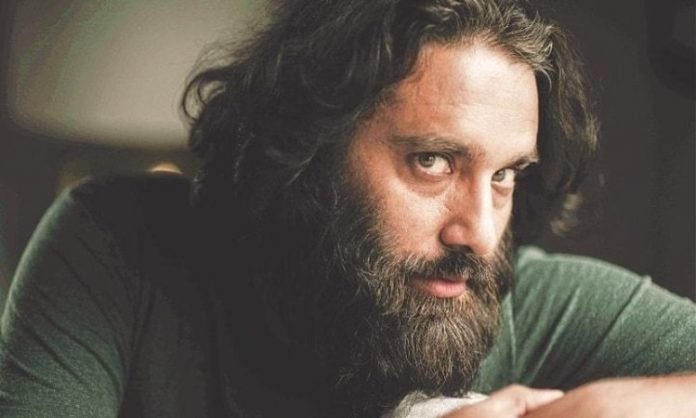“Do you think I would know that? Think about it: would someone who’s eccentric knows that they’re that? You have to tell me that, tum tau mujhay bachpan se jaanti ho [You’ve known me since childhood],” says Ali Noor in a phone conversation we’re having at the crack of dawn.
“Whatever I call myself is bullshit because it’s based around somebody else’s opinion that I paid attention to. I realised when you keep on seeing yourself from the eyes of the other, which I have done all my life, then you call yourself eccentric, creative, disciplined, undisciplined. But […] that’s bullsh*t, man. I’d rather call myself a ch******. Period.”
He’s speaking to me from the farmhouse in Lahore he moved into right before the coronavirus lockdowns earlier this year. I’m told its massive. Noor can spend hours walking through it — something he does for most of our conversation — while in between ordering breakfast (French toast) and taking hydration breaks. He speaks quite intensely and with purpose. The words roll out of his mouth seemingly as quickly as he’s thinking them. The more ‘into’ the conversation he gets, the faster he walks and you can hear him at times gasping for breath, but that doesn’t stop him from saying what he needs to. Breathing properly can wait.
It’s been several years since I’ve last spoken to Noor. Over the phone, in terms of his voice, mannerisms and vocal tone, he sounds at times uncannily like Rohail Hyatt (a surprise) and at times like his brother, Ali Hamza (not a surprise). From the sound of the birds in the background, I can tell he’s outside.
I’m told, in the last few years, he’s been going through a gradual but consistent change — an awakening, an evolution of sorts. “I’ve just stopped being scared,” he says. “I’ve lived my whole life in fear.” And now, he has no ***** to give. This is Ali Noor, unfiltered.
He’s been the bad, arrogant young boy of Pakistani rock. He’s been a control freak. He’s been an overthinker. So why has the moving spirit behind the band Noori chucked it all and refashioned himself as a go-with-the-flow hippie who listens to people? Has he just grown older?
One wonders whether last year’s health scare, which saw Ali Noor hospitalised after suffering a serious bout of Hepatitis A and had him fighting for his life, was a turning point in his life?

“I thought it was, but not at all,” he says. “After a little time, everything reverted back to normal. Truly. Which meant that all the sht started happening — the depression and the misery and everything was creeping up again. And the only thing that got me thinking was *yaar, iss ke honay ke bawajood bhi kuchh change kyun nahin ho raha hai [why is nothing changing despite all this having happened]? It should’ve, but it didn’t.”
His current album, Pagal, was recorded during the lockdown. The music of this album is light and preppy and experiments with a lot of pop music styles. Most of the songs lack the grand storytelling, revolutionary purpose, rebellion and angst we’re used to associating with Ali Noor with, as that was characteristic of the iconic band he founded and led for over 15 plus years, Noori. In Pagal, as a solo artist, Ali Noor just seems to be having fun and living in the moment.
There seems to be a massive line-up of artists with him this time around. “The concept of the line-up is those-who-are-willing-to-spend-the-night-at-our-house,” he says. “That’s it. It’s as simple as that. All the other people you see in the video just happen to be in it. If you were around, I’d have told you to join in as well. That’s why there’s no credit. There’s no point having credits — we don’t know who did what! I realise I love it this way.”
Anyone who is familiar with Noori would know that Noor has a reputation to micromanage and control every aspect of the sound. But this time, he’s done things differently. He’s taken a back seat. “They do what they want to do and I’ll see if it makes sense to me,” he says. “I’m not here to get any accolades. The process, the journey, is important. The output is irrelevant.”
What’s love got to do with it?
From the songs he’s recently released from the Pagal album, one that stands out is an ode to his wife of over 15 years, Mandana Zaidi, called Teray Saath. It’s a soulful, moving ballad, with a small guitar solo in between, Noor’s vocals enhanced and made richer with the backing vocalists. It’s a breath of fresh air in an industry where romantic expressions are usually reserved for the woman that you want or the one that got away — ahem, that ‘pehla pyaar’ that artists well into middle age never tire of singing about, as if nothing has happened in their lives since then — never about the one that stayed.

“It’s not a song to celebrate how much I love her,” clarifies Noor. “This song is about what would happen if Mandana dies. I’m not sure if I love her like that. [The song is saying that] ‘I don’t even know what I feel about you. The only thing I know is that if you die, I’ll be screwed’.”
It’s about the complexity of feelings in a mature intimate relationship, I offer. “Yes, of course!” he says, adding he’s always had a problem with writing love songs. “because […] mujhay love hota hi nahin hai [I never fall in love]. My idea of love never existed. The first time I heard a love song, it felt fake to me.”
What is his idea of love? I ask him. “I don’t know,” he responds. “I just know I’ve experienced love through and through. From the day I was born to date. And it was never about a person. Every human being se mujhay pyaar hota hai [I love every human being].” Whether he agrees or not, Tere Saath is based on the fear of losing a very important attachment and how life will be difficult without that person. It is most definitely a love song.
How (not) to name an album
Why is the album called Pagal [Mad]? “It wasn’t a pre-planned thing,” he says. “It was just natural. I realised mein tau pagal hoon [I am mad]. And I was like, ‘This is it!’”
That’s a lot of spontaneity from someone who’s always carefully planned out every single move he and anyone associated with him would make musically. But then again, this is Ali Noor 2.0., we just have to get used to that.
“It’s not something I’ve [over]thought,” he says, starting to the list the things he has overthought, including the title of the band, Noori. “The first album will be called Begum Gul Bakaoli Sarfarosh, the second Peeli Patti Aur Raja Jani Ki Gol Dunya and the third will be Suno Ke Mein Hoon Jawan. And then I reversed it all! [Expletive], this was all overthinking!
“And look at the consequences of that. After two albums, the third album, the so-called magnum opus ch****** ho ke nikaali! [was released after becoming a total idiot!]” There is a moment of silence after he’s said that. A silence from his side that’s filled by the sound of crows in the background. “Only for the reason that you have temporarily missed the window due to overthinking,” he adds.

The third album was released at a particularly difficult time in Pakistan’s music industry. Record labels were closing, as were music channels and the number of concerts had dramatically decreased partly because of security and partly because sponsors had seemingly shifted focus to fashion weeks. The environment for music in 2015, when the third album came out was vastly different from when the first album came out in 2003. Despite that, Noori released their third album themselves without a label or even a distributor. Noor is taking entirely too much responsibility for factors out of his control.
“I paid such a hefty price for it,” he says referring to his dictatorial attitude towards his bandmembers at the time. What price? “Sab loag nikal gaye life se [Everyone left my life]. That’s it,” he says, matter-of-factly, referring to the original bandmembers that each left to pursue solo careers almost after each album.
The one thing that has always driven me […] at the core of what I think makes me me, is that I think naturally I’ve had pleasure in seeing other people have fun. That’s how I get on stage. But to sustain it that is very difficult.”
Does he think he’s being too hard on himself? “No, I heard that yesterday,” responds Noor. “From everybody. I’m simply not hard on myself, that’s why I can say all these things now. This is not a repentance — even if it comes across as one. Because I understand now. When you understand, what is the repentance in it?”
A style that shines through
Judging from the songs released from this current album so far, they have a very strong ‘Ali Noor’ stamp on them — from the songwriting style to the overall delivery. “Yes, but that’s my limitation,” Noor responds earnestly. “Do you realise that? That’s a bad thing. It’s boring for me. The pleasure has not been in the music for me. I’m being very honest about it. The pleasure has been for them [the people who worked on the album]. And that’s a pleasure, to watch them have pleasure. You know what I’m saying?
“The one thing that has always driven me […] at the core of what I think makes me me, is that I think naturally I’ve had pleasure in seeing other people have fun. That’s how I get on stage. But to sustain it is very difficult.”

There’s a bit of angst in the music he’s previously released with Noori. “There was a lot of angst,” he corrects me. But this album doesn’t have that angsty feel to it, I venture. “Because that was rhetoric, na!” he says referring to Noori’s music. “When you wake up reading Manto and all that stuff, unthinkingly you become impacted by it,” Noor explains one of his songwriting influences.
“To say Hum dunya badal dein gey, hum ne khaayi hai dil ki qasam [We will change the world, we have sworn with our heart],” he elaborates on the lyrics of one of their most popular early releases, Dil Ki Qasam. “Koi b******* kar sakta hai? Dil ki qasam kaisay khatay hain aur dunya kaisay badaltay hain, yeh bhi bata do! [Can someone actually do this? Please elaborate how do you swear with your heart and how do you change the world!]
“What the f*** were we doing?” says Noor incredulously. “But that’s innocence, na. Let’s just call it that and move on. I doubt anyone can change the world single-handedly. You can’t just go around preaching it. Woh to poora model hi flop hai [That whole model is a flop].”
I’m horrified. Dil Ki Qasam is from their debut album Suno Ke Mein Hoon Jawan [2003] and that body of work was the anthem of my teenage youth. I still listen to those songs when I need a little motivation. Noor is trashing his own work that I, and countless others, hold very close to our heart.
You’re ruining it for me, I tell him. “No,” he corrects me. “I’m just asking you to grow up alongside me. I have nothing against them. But now when I say ‘Hum dunya badlein gey’ [We will change the world] and ‘Suno ke mein hoon jawan’ [Hear me I am young] it’s just going to be a regurgitation of that emotion. That’s total bullsht. *Woh nahin ho sakta hai [It can’t happen anymore].”
It’s not authentic to where he is right now, I offer. “Fundamentally what I’ve experienced on this album is that [expletive] I’ve transcended anyway,” he says. “There’s no confusion about that. But you’re comparing it with the past […] I’ve realised people are stuck there. That’s my fault. I haven’t shared my journey and evolution the way I should’ve. So, of course, people will freeze [their perception of me] into that. That’s a price I will have to pay.”
Noor intends to provide more regular updates on his social media platforms — Facebook, Instagram and YouTube. The evolution will now be (consistently) televised.
Hair today, here tomorrow

In the music videos for Pagal, Noor has grown out all of his hair — on his head and his face. It reminded me of when the bandmembers from Noori first grew out their hair in a similar way, right before the release of their second album Peeli Patti Aur Raja Jani Ki Gol Dunya [2005].
They debuted their drastically changed appearance from clean shaven boys-next-door to raging hippies playing loud, obnoxious rock music — the antithesis of version one of Noori — with their expletive-laden song Kuttay Te Tho Uttay. It was a calculated move, and it had the desired effect — audiences were just as shocked by their appearance as they were by the song. They either loved it or they loved to hate it.
This time round, this doesn’t seem like a fashion statement. Noor literally looks like a man gone wild. “Because that’s who I am,” he says, adding that his illness, the move to the farmhouse and the coronavirus lockdown, the latter two which made it harder to get to a groomer, helped him grow into this. He played along, getting it fixed for a while — “You can see the photos online” — but then he just stopped.
“It’s just convenient,” he says. “I’ve always done what is convenient. Whenever you’ve seen me, I’ve always been in my pyjamas.” That is somewhat correct. At least for the few times I’ve seen him around recording studios and rehearsal spaces when he’d visit Karachi.
“You know I’m not going to read your article, right?” says Ali Noor towards the end of our chat. “Because this conversation is the fun part.”
“I’m just joking,” he laughs. “I’m going to read it because I want to get an insight into your mind […] I’m not important.”
He might be older, wiser and more sedate but, having experienced what most would in several lifetimes, Ali Noor 2.0. is still very important.








